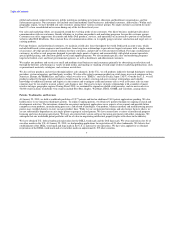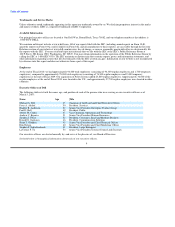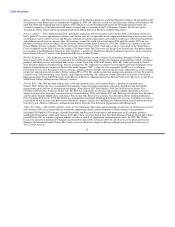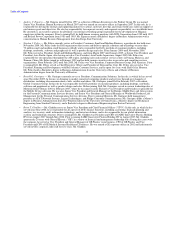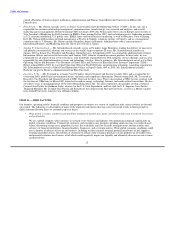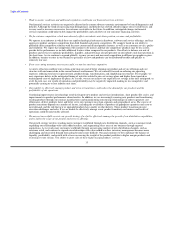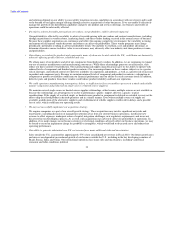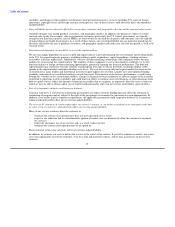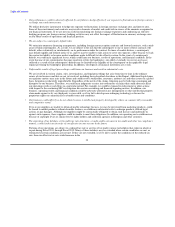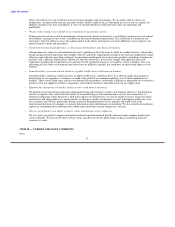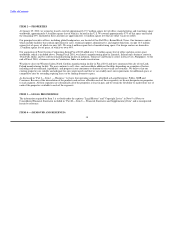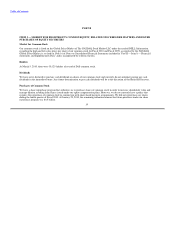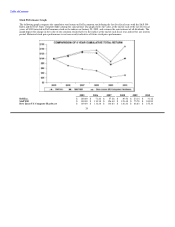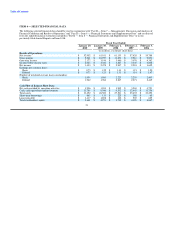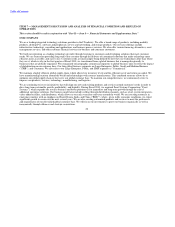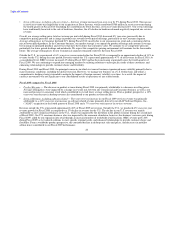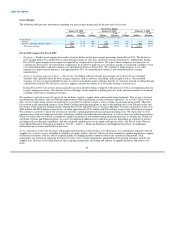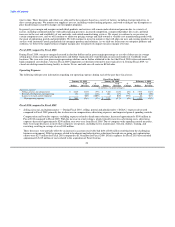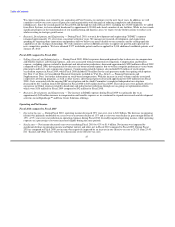Dell 2009 Annual Report Download - page 21
Download and view the complete annual report
Please find page 21 of the 2009 Dell annual report below. You can navigate through the pages in the report by either clicking on the pages listed below, or by using the keyword search tool below to find specific information within the annual report.
Table of Contents
future. Our effective tax rate could also increase if our geographic sales mix changes. We are under audit in various tax
jurisdictions. An unfavorable outcome in certain of these matters could result in a substantial increase to our tax expense. In
addition, changes in tax laws (including U.S. taxes on foreign operations) could adversely affect our operations and
profitability.
• We face risks relating to any inability by us to maintain strong internal controls.
If management is not successful in maintaining a strong internal control environment, we could have weaknesses in our control
environment, causing investors to lose confidence in our reported financial information. This could lead to a decline in our
stock price, limit our ability to access the capital markets in the future, and require us to incur additional costs to improve our
internal control systems and procedures.
• Current environmental and safety laws, or laws enacted in the future, may harm our business.
Our operations are subject to environmental and safety regulation in all of the areas in which we conduct business. Our product
design and procurement operations must comply with new and future requirements relating to the materials composition, energy
efficiency and collection, recycling, treatment, transportation and disposal of our electronics products, including restrictions on
mercury, lead, cadmium, lithium metal, lithium ion and other substances. If we fail to comply with applicable rules and
regulations regarding the transportation, use and sale of such regulated substances, we could be subject to liability. The costs
and timing of costs under environmental and safety laws are difficult to predict, but could have an unfavorable impact on our
business.
• Armed hostilities, terrorism, natural disasters, or public health issues could harm our business.
Armed hostilities, terrorism, natural disasters, or public health issues, whether in the U.S. or abroad, could cause damage or
disruption to us, our suppliers or customers, or could create political or economic instability, any of which could harm our
business. These events could cause a decrease in demand for our products, could make it difficult or impossible for us to deliver
products or for our suppliers to deliver components, and could create delays and inefficiencies in our supply chain.
• Infrastructure disruptions or breaches of data security could harm our business.
We depend on our information technology and manufacturing infrastructure to achieve our business objectives. If a disruption,
such as a computer virus, natural disaster, failure of a manufacturing or telecommunications system, lost connectivity, or
intentional tampering or data-breach by a third party impairs our infrastructure, we may be unable to receive or process orders,
manufacture and ship products in a timely manner, or otherwise conduct our business as usual. A disruption could cause us to
lose customers and revenue, particularly during a period of disproportionately heavy demand, and could result in the
unintentional disclosure of company or customer information and could damage our reputation. We also could incur significant
expense in remediating these problems and in addressing related data security and privacy concerns.
• Our success depends on our ability to attract, retain, and motivate our key employees.
We rely on key personnel to support anticipated continued rapid international growth and increasingly complex product and
service offerings. We may not be able to attract, retain, and motivate the key professional, technical, marketing, and staff
resources we need.
ITEM 1B — UNRESOLVED STAFF COMMENTS
None.
17


